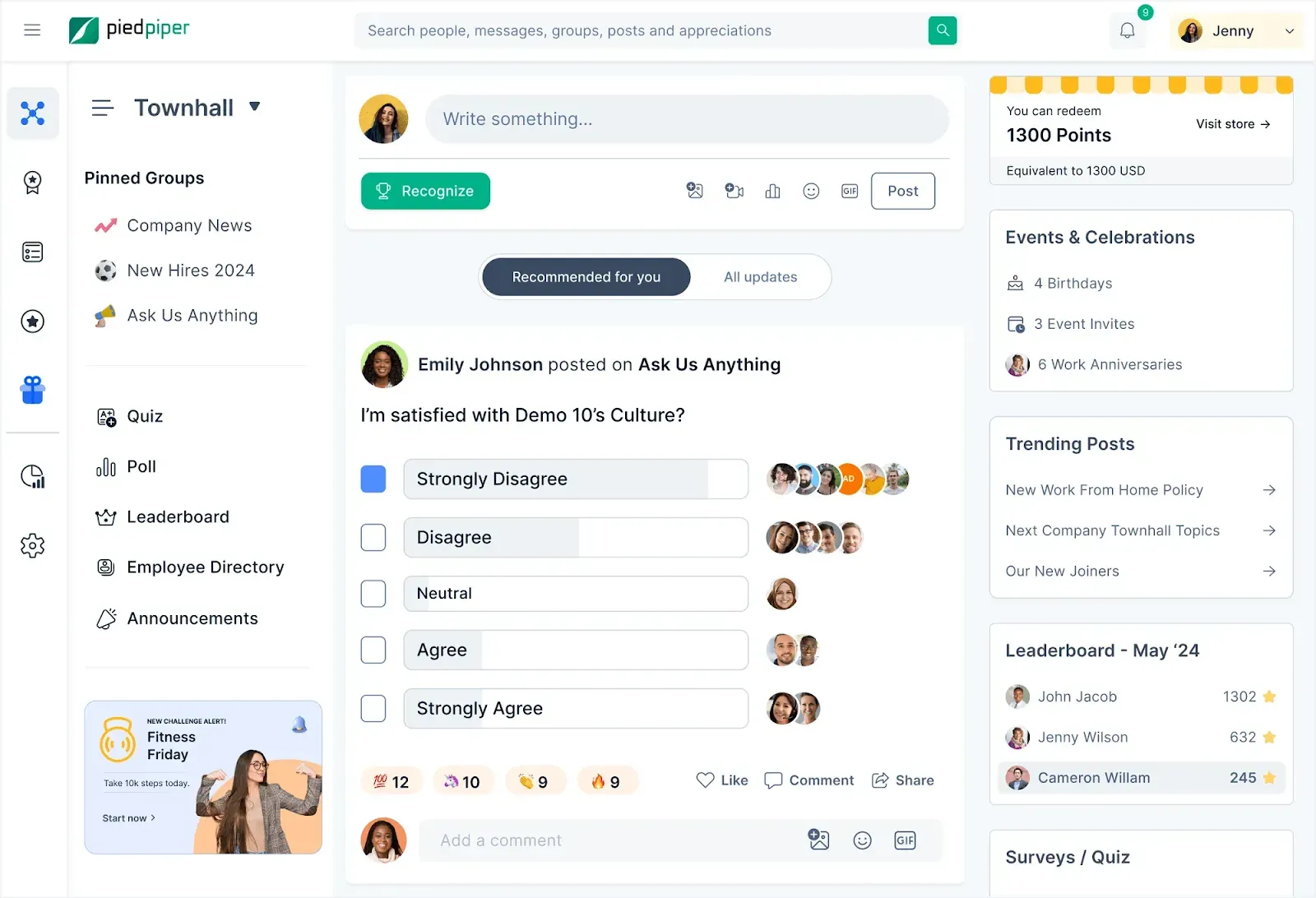How to Improve Employee Morale and Increase Productivity: Strategies for a Motivated, Engaged
Low morale hurts productivity and workplace culture. Boost employee morale with recognition, communication, and growth opportunities. Valued employees perform better and stay committed, driving business success. Use these strategies to build a motivated team.
Pada halaman ini
- Bagaimanakah semangat mempengaruhi produktiviti?
- Tanda-tanda semangat pekerja rendah
- Bagaimana untuk meningkatkan semangat pekerja di tempat kerja?
- Contoh syarikat yang meningkatkan semangat pekerja
- Bagaimana Empuls meningkatkan semangat dan produktiviti pekerja
- Kesimpulan: Mengekalkan semangat untuk produktiviti jangka panjang
- Soalan Lazim
Moral.
It’s the energy that fuels motivation, the difference between an engaged employee and one who’s simply clocking in and out. It’s what makes employees bring their best to work instead of dragging their feet through the day.
Forbes defines employee morale as “...the job satisfaction, attitude, and outlook that employees have while at your business.” A workplace thrives when morale is high, and productivity follows. But when motivation dips, so does performance, collaboration, and overall workplace culture.
Businesses depend on their employees to grow, innovate, and succeed. When morale drops, burnout creeps in, 😫😞 and productivity takes a hit. A Gallup study found that 23% of employees experience burnout at work very often or always, while another 44% report feeling burned out sometimes. That’s nearly two-thirds of the workforce struggling to stay motivated.
Boosting employee morale isn’t optional—it’s a necessity. A team that feels valued, recognized, and supported works harder, stays longer, and drives business success.
Bagaimanakah semangat mempengaruhi produktiviti?
Terdapat hubungan langsung antara semangat pekerja dan produktiviti. Apabila semangat tinggi, pekerja bermotivasi, komited, dan lebih berkemungkinan untuk melakukan usaha terbaik mereka.
Kajian Gallup mendapati bahawa pasukan yang sangat terlibat menunjukkan keuntungan 21% lebih besar, menekankan kesan semangat ke atas kejayaan syarikat. Sebaliknya, semangat yang rendah boleh memberi kesan riak, mengheret produktiviti apabila pekerja menjadi tidak berminat, kurang bersemangat, dan lebih terdedah kepada kesilapan.
Apabila pekerja berasa tidak dihargai atau terharu, prestasi mereka secara semula jadi menurun, mengakibatkan tarikh akhir terlepas, kualiti kerja lebih rendah dan kekurangan inisiatif. Mengekalkan semangat yang tinggi memastikan tempat kerja di mana pekerja tidak sabar-sabar untuk menyumbang dan pergi ke atas dan seterusnya.
Tanda-tanda semangat pekerja rendah
Menyedari tanda-tanda semangat pekerja yang rendah adalah penting untuk menangani isu sebelum ia meningkat. Berikut ialah beberapa petunjuk biasa:
1. Ketidakhadiran meningkat
Apabila pekerja mula mengambil lebih banyak hari sakit atau kerap menelefon tanpa hadir, ia selalunya menjadi tanda merah. Walaupun sebab peribadi mungkin memainkan peranan, ketidakhadiran yang meningkat juga boleh menandakan pengasingan atau keletihan. Pekerja yang mempunyai semangat yang rendah mungkin berasa kurang bermotivasi untuk hadir ke tempat kerja, terutamanya jika mereka tidak lagi berasa dilaburkan dalam peranan mereka.
2. Kemerosotan dalam produktiviti
Penurunan dalam kualiti atau kuantiti kerja adalah satu lagi tanda jelas semangat rendah. Pekerja mungkin bergelut untuk memberi tumpuan, terlepas tarikh akhir atau menyampaikan kerja di bawah taraf kerana mereka telah kehilangan motivasi dan dorongan. Apabila pekerja diberhentikan, mereka sering melakukan kurang usaha, yang membawa kepada produktiviti pasukan keseluruhan yang lebih rendah dan peningkatan kesilapan.
3. Kurang komunikasi
Pekerja yang pernah aktif dalam perbincangan atau proaktif dalam berkongsi idea mungkin menjadi senyap apabila semangat rendah. Mereka mungkin mengelakkan mesyuarat, tidak menyumbang dalam perbincangan pasukan, atau kelihatan keberatan untuk menyuarakan fikiran mereka. Penarikan diri daripada komunikasi ini menunjukkan mereka berasa terputus hubungan atau kurang nilai.
4. Sikap negatif
Moral yang rendah boleh membawa kepada perubahan ketara dalam sikap pekerja. Ini mungkin nyata sebagai peningkatan aduan tentang kerja, ketegangan di kalangan rakan sekerja atau pandangan pesimis umum. Tenaga pasukan yang pernah positif boleh bertukar toksik, menjejaskan prestasi individu dan persekitaran kerja keseluruhan.
5. Kadar perolehan yang tinggi
Apabila pekerja meninggalkan syarikat dengan lebih kerap, ia selalunya kerana mereka mencari persekitaran kerja yang lebih baik. Pusing ganti yang tinggi adalah petanda utama bahawa semangat pekerja telah merosot, kerana pekerja tidak lagi melihat masa depan dengan syarikat atau merasa dihargai. Ini juga boleh mengakibatkan kehilangan bakat dan kos yang lebih tinggi berkaitan dengan pengambilan dan latihan kakitangan baharu.
Mengenal pasti tanda-tanda ini lebih awal membolehkan pengurus menangani isu moral sebelum ia hilang kawalan, meningkatkan pengekalan dan dinamik pasukan.
Bagaimana untuk meningkatkan semangat pekerja di tempat kerja?
Sekiranya anda ingin mengelakkan ini, berikut adalah beberapa petua untuk meningkatkan semangat pekerja di tempat kerja, memulihkan semangat dan penglibatan di kalangan tenaga kerja anda dengan cepat dan cekap.
1. Meaningful work and autonomy
Apabila pekerja merasakan kerja mereka bermakna dan sejajar dengan nilai dan matlamat syarikat, semangat mereka bertambah baik. Selain itu, membenarkan pekerja tahap autonomi tertentu dalam peranan dan membuat keputusan mereka boleh meningkatkan rasa pemilikan dan kepuasan kerja mereka.
This led to what Buffer called empowered accountability.
“We want to ensure that team members lean into their expertise when making decisions and providing support,” Åsa Nyström, VP of Customer Advocacy, explains. “We want to remove hesitation about decision-making and to enable our team to support our customers the best we can.”
2. Provide care packages to remote workers
Keadaan semasa yang dihadapi oleh banyak perniagaan di seluruh dunia, dengan kerja jarak jauh tidak dapat dielakkan kerana ruang pejabat bersama diambil tindakan, bermaksud bahawa jenis baru keletihan pekerja berlaku.
Kaji selidik Glint terhadap lebih daripada 700,000 pekerja di seluruh dunia mendapati bahawa komen yang berkaitan dengan keletihan meningkat dua kali ganda dari Mac 2020 (pra-lockdown) hingga April 2020 (semasa penutupan, bekerja dari jauh), meningkat daripada 2.7% kepada 5.4%
Syukurlah anda dapat menghidupkan semula semangat ahli pasukan yang bekerja dari rumah dengan menghantar pakej penjagaan yang akan memberi nafas baharu kepada persediaan domestik mereka.
Terdapat banyak idea untuk pakej penjagaan yang perlu dipertimbangkan, daripada kotak snek yang lazat untuk mengekalkan selera sepanjang hari, kepada kombinasi tersuai yang disesuaikan dengan personaliti dan hobi khusus pekerja individu.
Mesej tersirat dari mana-mana pakej penjagaan adalah ini; Ingat untuk berehat. Ia juga akan menunjukkan kepada pekerja bahawa anda terkejut dengan keperluan mereka dan bersimpati dengan perjuangan mereka.
3 . Peluang pembangunan profesional
Offering opportunities for employees to grow and develop their skills not only enhances their value to the organization but also shows that you care about their long-term career goals. This can include workshops, training sessions, mentoring programs, or support for pursuing additional education through online upskilling platforms.
Their developmental programs encompass a mix of face-to-face and online training sessions, self-directed learning tools, one-on-one coaching, and resources designed for managers to cultivate top-tier teams.
4. Show recognition for achievements
Salah satu cara terbaik untuk meningkatkan semangat pekerja adalah dengan memberi🏆 ganjaran dan mengiktiraf🥇 usaha mereka.
Semangat boleh merosot jika ahli pasukan berasa seperti mereka meletakkan semua mereka ke dalam projek dan berjaya, hanya untuk usaha mereka untuk tidak diiktiraf.
Anda boleh membetulkannya dengan memastikan bahawa anda menunjukkan penghargaan anda satu-sama-satu dan dalam tetapan kumpulan. Menyedari usaha dan pencapaian pekerja, tidak kira berapa besar atau kecil adalah apa yang menjadikan pemimpin benar-benar memberi inspirasi.
Likewise, it is sensible to invest in a rewards and recognition platform that encourage other team members to single out the successes of their colleagues, and you can even formalize this process if you wish, creating a self-perpetuating approach to the recognition that will help with team bonding and boosting employee morale.
5. Celebration of milestones and achievements
Celebrate both personal and professional milestones with your employees. This could include birthdays, work anniversaries, project completions, or hitting important targets. Publicly recognize and appreciate their contributions during team meetings or through internal communication channels. By acknowledging their achievements, you reinforce their sense of belonging and worth within the organization.
6. Don’t communicate outside of office hours
Salah satu cara yang dijamin untuk memberi tekanan kepada pekerja dan menyebabkan mereka merasa tidak berpuas hati adalah untuk memupuk budaya tempat kerja yang mengharapkan ketersediaan di luar waktu menjadi norma.
Walaupun anda tidak secara jelas mengatakan bahawa pekerja harus berada dalam panggilan untuk membalas e-mel, panggilan, dan mesej segera apabila mereka tidak berada di meja mereka, tindakan mudah berkomunikasi di luar waktu kontrak mereka boleh menimbulkan tekanan ini.
Adalah lebih baik untuk pergi ke arah yang bertentangan sama sekali dan mewujudkan dasar untuk semua bentuk komunikasi berkaitan kerja yang tidak menggalakkan interaksi langsung antara rakan sekerja dan pengurus pada waktu petang, sebagai contoh.
Ini semua tentang mewujudkan keseimbangan ⚖️ kerja-kehidupan yang sihat , dan bukan hanya membayar perkhidmatan bibir kepadanya. Anda mungkin berfikir bahawa ini boleh menghalang produktiviti, tetapi pada hakikatnya, jika pekerja lebih bahagia dan lebih banyak kandungan, mereka akan menjadi lebih produktif pada waktu pejabat daripada yang mereka lakukan jika mereka membakar lilin di kedua-dua hujungnya.
Ini tidak sesuai untuk setiap pekerja, walaupun lebih baik daripada alternatif tidak bertindak sepenuhnya.
7. Peer recognition programs
While formal recognition is important, involving peers in recognizing each other's contributions can be equally impactful. Implement a peer recognition program where employees can nominate their colleagues for their achievements, teamwork, or any positive behavior.
This fosters a culture of appreciation and camaraderie among employees. Consider incorporating rewards or incentives, such as gift cards or additional time off, to make the recognition even more meaningful.
The kudos come in the form of small, themed tokens or cards, which can sometimes be accompanied by gift cards or other tangible rewards. This peer-to-peer appreciation fosters camaraderie among team members and promotes a positive workplace culture.
8. Actively ask for feedback
Banyak pengurus berpendapat bahawa sudah cukup untuk mengatakan kepada ahli pasukan mereka bahawa mereka boleh datang kepada mereka dengan apa-apa isu atau melekat mata yang mereka mahu bangkitkan.
Malangnya, ini bergantung kepada pekerja yang proaktif dan cukup yakin untuk menangani subjek yang berpotensi rumit dengan kelebihan atas inisiatif mereka sendiri.
Penyelesaiannya adalah untuk memastikan bahawa mendapatkan maklum balas adalah sebahagian daripada tanggungjawab biasa anda, sama ada anda mengintegrasikannya dengan pengejaran satu sama satu yang anda ada dengan kakitangan, atau sama ada anda melangkah lebih jauh dan menjadualkan temu duga secara khusus untuk mengetahui perkara yang mengekalkan pekerja dengan syarikat, dan apakah penambahbaikan yang boleh dilakukan untuk mengukuhkan lagi kesetiaan mereka, atau menyediakan tinjauan tanpa nama, seperti yang digalakkan oleh pekerja Empuls , seperti yang digalakkan oleh pekerja mereka kepada Empul.
Ini juga akan menentukan masalah yang mungkin tidak anda ketahui, dan membolehkan anda membuat perubahan positif yang memberi manfaat kepada semua pekerja, yang membawa kepada peningkatan moral yang dicari.
9. Keep the communication coming
Communication is the key to building great teams and organizations. Today's employees are extremely fast-paced and expect to keep a tab on everything that is happening around them - be it success or failure. Not communicating something or keeping the employees uninformed about the happenings can demoralize and pull them down.
While the leaders can keep everyone in the organization up to date about the organizational happenings, employees can react to the shared communication, share their viewpoints and thoughts.
10. Demonstrate the broader impact they have
Salah satu cara terakhir untuk menjadikan pekerja lebih terlibat dengan organisasi yang mereka wakili dan kurang cenderung untuk menjadi kecewa adalah untuk memastikan mereka memahami apa sumbangan mereka ke arah.
Cara paling mudah untuk melakukan ini adalah dengan kerap berkongsi kemas kini tentang bagaimana syarikat itu semakin jauh, di mana ia mendapat daya tarikan, dan apa perbezaan jabatan mereka dalam konteks ini. Rasa seperti anda adalah sebahagian daripada keseluruhan yang lebih luas dan mempunyai peranan penting untuk dimainkan akan menggalakkan sesiapa sahaja untuk terus menaiki trak, walaupun dalam keadaan yang paling mencabar.
Bina budaya mengutamakan rakyat dan pengalaman pekerja yang hebat dengan maklum balas pekerja yang berterusan & peningkatan berterusan.
11. Wellness initiatives and stress management programs
Melaksanakan program kesihatan menyeluruh yang memfokuskan kepada kesejahteraan fizikal dan mental. Menawarkan bengkel tentang pengurusan tekanan, kesedaran dan daya tahan.
Provide access to counseling services or employee assistance programs (EAPs) to support employees dealing with personal or work-related challenges. By prioritizing their holistic well-being, you show that you care about their health and happiness beyond their job roles.
Contoh syarikat yang meningkatkan semangat pekerja
Banyak syarikat telah menyedari kepentingan semangat pekerja dan telah melaksanakan strategi yang berjaya untuk memperbaikinya. Berikut adalah beberapa contoh kehidupan sebenar:
1. Fokus Airbnb pada kepunyaan
Airbnb telah mencipta budaya yang mengutamakan kepunyaan, baik untuk pekerja dan pelanggannya. Syarikat secara aktif menggalakkan keterangkuman dengan menggalakkan pekerja berkongsi kisah peribadi mereka dan membina hubungan yang kukuh dengan rakan sebaya mereka.
Airbnb memperkenalkan kumpulan sumber pekerja (ERG), yang membenarkan individu daripada latar belakang yang berbeza untuk berhubung melalui minat atau pengalaman yang dikongsi, memupuk semangat kemasyarakatan.
Selain itu, Airbnb menganjurkan "Hari Kepunyaan", di mana pasukan mengambil bahagian dalam bengkel dan perbincangan yang bertujuan untuk mewujudkan persekitaran kerja yang lebih inklusif. Fokus pada keterangkuman ini telah membantu Airbnb membina persekitaran di mana pekerja berasa dihargai, dihargai dan bermotivasi untuk melakukan yang terbaik.
2. Dasar gaji telus dan keseimbangan kerja-kehidupan penampan
Penampan terkenal dengan ketelusan radikalnya, terutamanya apabila ia berkaitan dengan gaji. Syarikat secara terbuka berkongsi formula gajinya, membolehkan pekerja melihat dengan tepat cara pampasan dikira, memastikan keadilan dan menghapuskan tekaan. Ketelusan ini mewujudkan budaya kepercayaan dan kesaksamaan, meningkatkan semangat pekerja.
Selain itu, Penampan mempunyai dasar kerja jauh sepenuhnya, membenarkan pekerja bekerja dari mana-mana sahaja di dunia. Fleksibiliti ini memberi pekerja kawalan ke atas jadual mereka dan menggalakkan keseimbangan kerja-kehidupan yang lebih sihat. Dengan menggalakkan kepercayaan, keadilan dan fleksibiliti, Buffer telah mencipta budaya di mana pekerja berasa diberi kuasa dan bermotivasi tinggi.
3. Aktivisme alam sekitar dan budaya kerja Patagonia
Komitmen Patagonia terhadap aktivisme alam sekitar sangat tertanam dalam budaya kerjanya, yang mempunyai kesan langsung ke atas semangat pekerja. Syarikat menggalakkan pekerjanya melibatkan diri dalam usaha alam sekitar, menawarkan mereka cuti berbayar untuk menyertai aktivisme alam sekitar dan program sukarelawan.
Inisiatif unik ini menyelaraskan minat pekerja dengan kerja profesional mereka, mewujudkan tujuan yang lebih mendalam.
Selain itu, Patagonia telah menerima persekitaran kerja yang fleksibel, menggalakkan pekerja menikmati aktiviti luar dan mengekalkan keseimbangan kerja-kehidupan yang sihat. Dengan membenarkan pekerja menyumbang kepada perkara yang mereka ambil berat, Patagonia telah memupuk tempat kerja yang memupuk kesetiaan, tujuan dan semangat yang tinggi.
4. Cuti ibu bapa Spotify dan inisiatif kepelbagaian
Spotify telah melaksanakan beberapa dasar cuti ibu bapa yang paling progresif dalam industri. Syarikat itu menawarkan enam bulan cuti ibu bapa berbayar kepada semua ibu bapa, tanpa mengira jantina, memberikan fleksibiliti kepada pekerja untuk terikat dengan anak baharu mereka. Dasar ini menunjukkan komitmen Spotify untuk menyokong kehidupan peribadi pekerja, yang memberi kesan positif kepada semangat dan pengekalan.
Selain itu, Spotify telah melancarkan pelbagai inisiatif kepelbagaian dan rangkuman yang bertujuan untuk mewujudkan tempat kerja yang inklusif. Program seperti "Spotifamily," yang memfokuskan pada memastikan persekitaran yang mesra untuk semua pekerja dan pelbagai peluang bimbingan untuk kumpulan yang kurang diwakili, telah membantu Spotify memupuk budaya hormat-menghormati, kepercayaan dan kesaksamaan. Dengan membuat pekerja berasa dihargai untuk siapa mereka, Spotify telah berjaya meningkatkan semangat dan penglibatan secara menyeluruh.
Contoh yang diperluaskan ini mempamerkan cara syarikat mencipta persekitaran kerja yang bermakna dan positif yang meningkatkan semangat pekerja dan menyumbang kepada produktiviti jangka panjang.
Bagaimana Empuls meningkatkan semangat dan produktiviti pekerja

Empuls mengubah cara syarikat mendekati semangat dan produktiviti pekerja dengan mewujudkan budaya kerja di mana pengiktirafan, ganjaran dan faedah bermakna menjadi teras penglibatan.
Ini bukan hanya tentang prestasi yang memberi ganjaran—ia mengenai membina tempat kerja di mana setiap pekerja berasa dihargai, bermotivasi dan dihubungkan dengan gambaran yang lebih besar.
- Peer-to-peer recognition: Empuls makes employee recognition an everyday experience. Whether it's a small accomplishment or going above and beyond, employees can celebrate each other’s achievements. This fosters positivity and strengthens team morale, making employees feel valued.
- Tailored rewards: Empuls offers personalized perks and exclusive discounts on everything from electronics to wellness programs. These rewards show employees that their well-being is a priority, boosting loyalty and helping them maintain a healthy work-life balance.
- Early wage access: Financial stress can impact productivity, and Empuls helps alleviate that by offering employees early access to their earned wages. This feature allows them to manage unexpected expenses, reducing stress and allowing them to focus better at work.
- Employee well-being: Empuls empowers employees with perks like fitness allowances, mental health support, and home office upgrades, ensuring they feel supported in every aspect of their lives. When employees feel cared for, their productivity increases naturally.
Pendek kata, Empuls memperkasakan syarikat untuk mencipta budaya pengiktirafan dan sokongan yang mengekalkan semangat tinggi dan produktiviti melonjak, memastikan tenaga kerja anda berasa dihargai setiap langkah.
Kesimpulan: Mengekalkan semangat untuk produktiviti jangka panjang
Meningkatkan semangat pekerja bukanlah penyelesaian sekali sahaja; ia adalah usaha berterusan yang memerlukan perhatian, komitmen dan pemahaman yang jelas tentang perkara yang membuatkan pekerja berasa dihargai. Syarikat yang mengutamakan kesejahteraan pekerja memupuk budaya keterangkuman dan menggalakkan komunikasi terbuka sering melihat manfaat yang ditunjukkan dalam produktiviti yang lebih tinggi, penglibatan pekerja yang lebih kukuh dan kadar pusing ganti yang lebih rendah.
Apabila pekerja berasa bermotivasi, diiktiraf dan berhubung dengan matlamat syarikat, mereka secara semula jadi menyumbang lebih banyak dan berprestasi lebih baik. Mengekalkan semangat yang tinggi melibatkan mendengar secara berterusan kepada pekerja, menangani kebimbangan mereka, dan mewujudkan tempat kerja di mana semua orang berasa dihargai dan diberi kuasa.
Dengan melaksanakan strategi seperti program pengiktirafan, dasar kerja yang fleksibel dan inisiatif kesejahteraan, perniagaan boleh mewujudkan persekitaran di mana pekerja berkembang maju, yang membawa kepada produktiviti dan kejayaan jangka panjang.
Soalan Lazim
1. Apakah moral pekerja?
Moral pekerja merujuk kepada keseluruhan sikap, pandangan, dan kepuasan pekerja terhadap tempat kerja mereka. Semangat yang tinggi membawa kepada penglibatan dan produktiviti, manakala semangat yang rendah boleh mengakibatkan pengasingan dan prestasi berkurangan.
2. Bagaimanakah semangat pekerja memberi kesan kepada produktiviti?
Semangat pekerja yang tinggi memupuk motivasi, yang membawa kepada peningkatan produktiviti dan kualiti kerja yang lebih baik. Moral yang rendah, sebaliknya, boleh menyebabkan pengasingan, tarikh akhir terlepas, dan penurunan dalam keseluruhan output.
3. What are the consequences of low employee morale?
Semangat yang rendah boleh membawa kepada penurunan produktiviti, peningkatan kesilapan, dinamik pasukan yang lemah, ketidakhadiran yang lebih tinggi dan pusing ganti pekerja, yang kesemuanya boleh memberi kesan negatif kepada prestasi keseluruhan syarikat.
4. Bagaimanakah syarikat boleh meningkatkan semangat pekerja?
Syarikat boleh meningkatkan semangat melalui pengiktirafan tetap, menyediakan peluang untuk pertumbuhan kerjaya, menawarkan keseimbangan kehidupan kerja, memupuk persekitaran kerja yang positif dan menyokong kesejahteraan pekerja.
5. Mengapakah pengiktirafan pekerja penting untuk semangat?
Pengiktirafan membuatkan pekerja berasa dihargai dan dihargai atas usaha mereka, yang seterusnya meningkatkan motivasi dan komitmen mereka kepada syarikat. Pengiktirafan tetap membantu mengekalkan semangat yang tinggi.
6. Bagaimanakah keseimbangan kerja-kehidupan boleh meningkatkan semangat pekerja?
Menawarkan pengaturan kerja yang fleksibel dan menghormati masa peribadi membantu pekerja mengurus kehidupan peribadi dan profesional mereka dengan lebih baik, mengurangkan keletihan dan meningkatkan kepuasan.
7. Apakah peranan yang dimainkan oleh kepimpinan dalam semangat pekerja?
Leadership plays a critical role in setting the tone for morale. Transparent, supportive leaders who communicate openly and recognize employee efforts create a positive work













